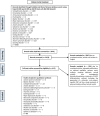Mental health dished up-the use of iPSC models in neuropsychiatric research
- PMID: 32377792
- PMCID: PMC7578166
- DOI: 10.1007/s00702-020-02197-9
Mental health dished up-the use of iPSC models in neuropsychiatric research
Abstract
Genetic and molecular mechanisms that play a causal role in mental illnesses are challenging to elucidate, particularly as there is a lack of relevant in vitro and in vivo models. However, the advent of induced pluripotent stem cell (iPSC) technology has provided researchers with a novel toolbox. We conducted a systematic review using the PRISMA statement. A PubMed and Web of Science online search was performed (studies published between 2006-2020) using the following search strategy: hiPSC OR iPSC OR iPS OR stem cells AND schizophrenia disorder OR personality disorder OR antisocial personality disorder OR psychopathy OR bipolar disorder OR major depressive disorder OR obsessive compulsive disorder OR anxiety disorder OR substance use disorder OR alcohol use disorder OR nicotine use disorder OR opioid use disorder OR eating disorder OR anorexia nervosa OR attention-deficit/hyperactivity disorder OR gaming disorder. Using the above search criteria, a total of 3515 studies were found. After screening, a final total of 56 studies were deemed eligible for inclusion in our study. Using iPSC technology, psychiatric disease can be studied in the context of a patient's own unique genetic background. This has allowed great strides to be made into uncovering the etiology of psychiatric disease, as well as providing a unique paradigm for drug testing. However, there is a lack of data for certain psychiatric disorders and several limitations to present iPSC-based studies, leading us to discuss how this field may progress in the next years to increase its utility in the battle to understand psychiatric disease.
Keywords: ADHD; Affective disorders; Mental disorders; Stem cells; hiPSC; iPSC.
Conflict of interest statement
SKS has received author’s and speaker`s honoraria from Takeda/Shire and Medice Arzneimittel Pütter GmbH. All other authors have no conflict of interest to declare.
References
-
- American Psychiatric Association (2000) Diagnostic and statistical manual of mental disorders. 4th edn, text rev. 10.1176/appi.books.9780890423349
Publication types
MeSH terms
LinkOut - more resources
Full Text Sources
Medical


